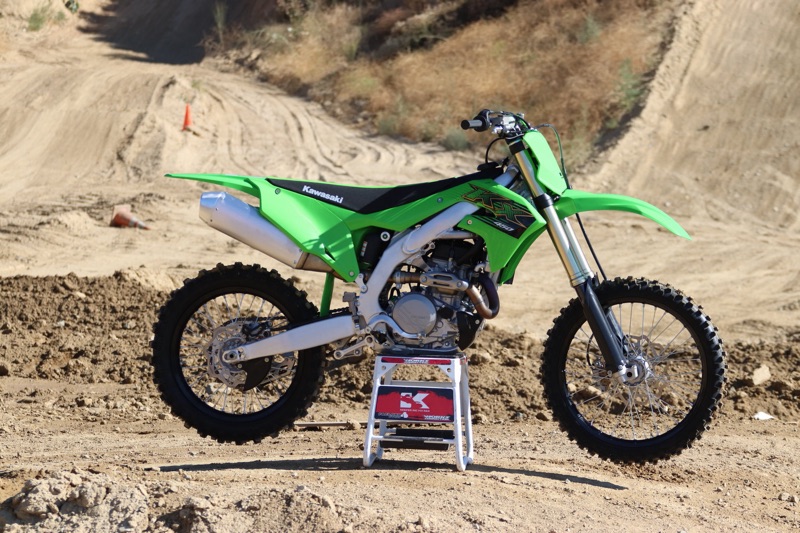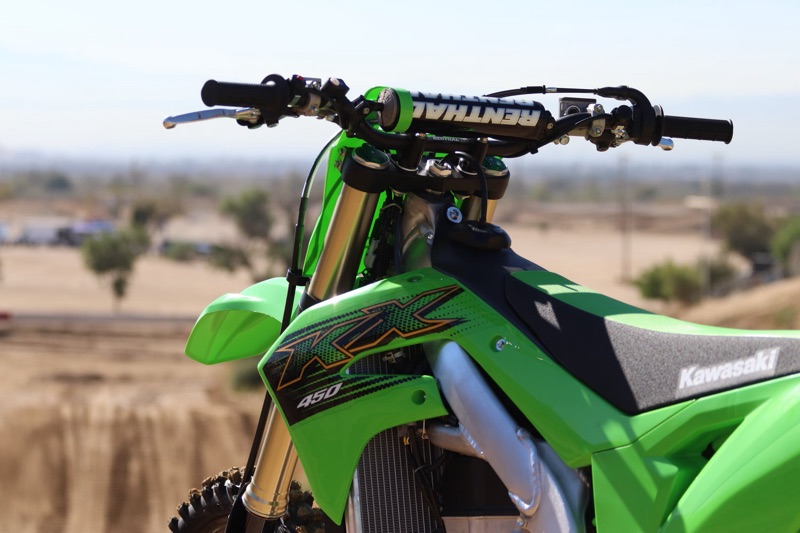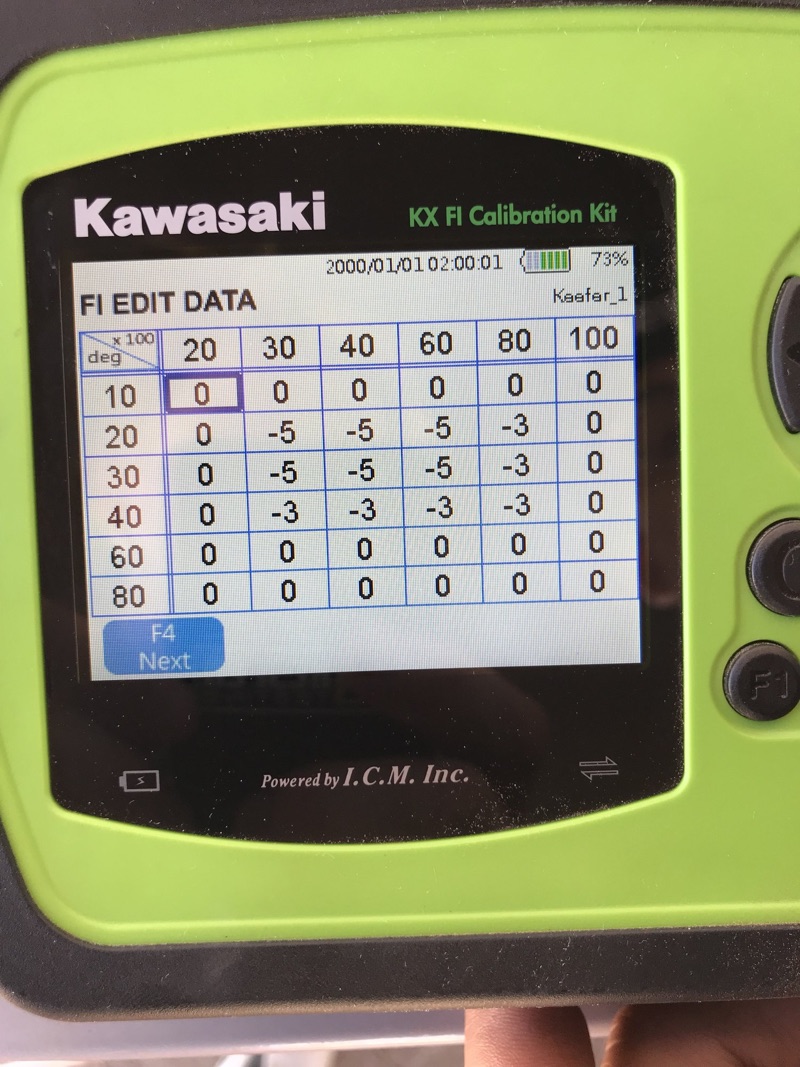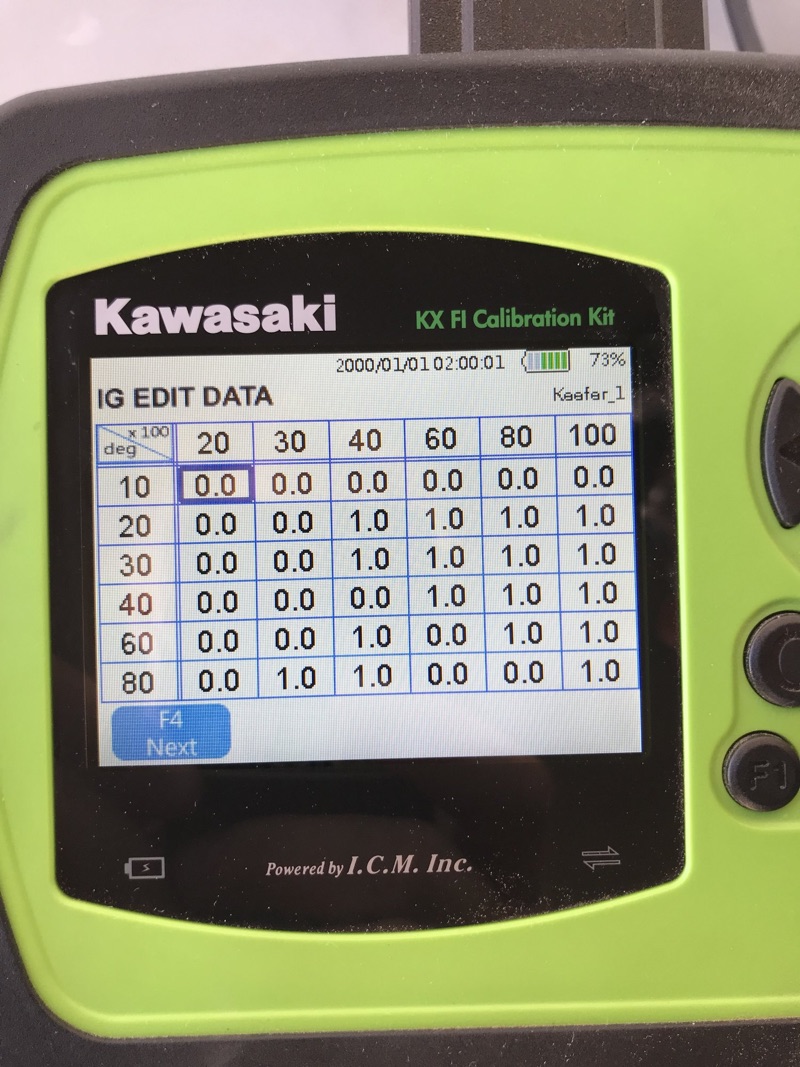Share This Article
The 2020 Kawasaki KX450 is exactly the same as the 2019 Kawasaki KX450, but the 2020 version just has more green. Kawasaki focused all of its R&D efforts on the KX250 for 2020 so the bigger brother just got a few more green plastic pieces, but that doesn’t mean we didn’t hit the R&D’ing hard. I really wanted to get some updated settings for you Team Green riders out there in hopes that it will help you set up your 2019-2020 KX450 in a more timely manner. Here are some thoughts and settings on the 2020 Kawasaki KX450:

Engine Feel: Just in case you were trying to decide on if the 2020 KX450 is better than the 2018 version, let me tell you, there is no comparison. The 2020 comes on quicker with a lighter, more free-revving feel and has less engine braking. I am usually not a guy who likes to de-tune a stock 450cc motocross bike, but the Kawasaki simply is too crisp from 0-5% throttle opening on slicker/hard pack tracks. Yes, too crisp! Where you feel this 0-5% is when you’re barely on the throttle through longer ruts. The KX450 gets jumpy with the stock green coupler and it upsets the chassis, which makes you very inconsistent through corners. Once the black coupler is installed it controls that 0-5% and gives you an incredible, yet smooth pulling power that feels similar to a KTM 450 SX-F. The mid range has a nice amount of meat and the smoother pulling power of the top end/over-rev is noticeable on longer straights or up hills. I didn’t lose mid to top end pulling power with the black coupler (compared to the stock green one) and I could ride the KX450 more aggressively through corners. The engine is super connected to the rear wheel and never steps out coming out of corners. This is an impressive power plant! After I rode with the black coupler a few times I decided that I would like to increase the mid to top end pull so I created a map with Kawasaki to get some more in that area. *See below for map*
Weight Feeing (Chassis): I was told that the 2020 Kawasaki KX450’s frame is 1.87 pounds lighter than it was in 2018. The total weight of the new machine has only increased roughly three pounds from 2018, but to me it feels lighter than the 2018. Why? I feel it is because of the way the 2020 Kawasaki makes its power. It is very free feeling and snappy which makes this bike have a very light/nimble feeling through corners. I am able to lay it down with ease and cut down under a blown out rut almost as easy as a KTM/Husqvarna. I do get a little twitch on de-cel (which can be fixed with a fork spring change), but it wasn’t a horrible or un-easy feeling. Straight line stability is still the same straight and arrow Kawasaki feel that you expect, but with added traction. The frame absorption is the best attribute of this machine and other manufacturers should take notice of how well this KX450 feels when the track goes to crap. The whole bike feels friendlier than any other 2020 machine on square edge and the only other one that comes close in comfort is the Yamaha YZ450F.

Hydraulic Clutch: The Nissin hydraulic clutch feels nothing like a Brembo or Magura. The Nissin hydraulic feel is a little bit of cable and hydro. What the hell does that mean Keefer? It means that there is a little play in the Nissin hydraulic lever that makes it feel like a cable pull initially. Unlike a Brembo where there is no play and is very touchy (on/off feel), the Nissin has more of a progressive feeling. So far I prefer the Nissin clutch engagement/feel over the Brembo. I like to ride the clutch a little with my finger while I ride, so having that little bit of play ensures that I don’t burn up my clutch as quick. The clutch can slip at times under heavy load/under throttle if the track is super deep. You will be able to feel the lever start to creep in towards your grip when accelerating out of corners at times. To combat this you can simply remove the judder spring and add a fiber to the clutch pack.

Suspension Comfort: The 2020 Kawasaki is so much more balanced than previous generation KX450’s and I was able to set the front end down where I wanted to without feeling like the front end was going to snap my wrists. The fork has tons of comfort, but is also too soft/divy for my liking. At tracks with hills or sizable jumps, the fork was too low in the stroke and bottomed too many times. Going stiffer on the compression only hurt de-cel bump comfort, so I settled on going slower on the rebound, which helped some. The shock is soft as well on slap down landings, but going eight clicks (two full turns) in helped keep the rear end up and thus helps wallow feeling. This setting will get you by on most tracks, but do yourself a favor and read the recommended suspension settings below for optimal balance of the KX450. The recommended settings below will help with hold up and ride comfort.

Cornering/Chassis: The 2020 KX450 is a more “neutral” cornering machine than in previous years. I am able to get more front end bite than last year, but also am still able to rear steer the green machine very well too. I had a rear end steering tester with me at the intro and he liked how well it backed into corners as well as much as I liked the front end bite from mid-exit of corner. I say mid-end because the KX450 still does have a slight vague feel on entrance of corners so Raising the fork up 2mm in the clamp helps this feeling somewhat and gives you increased front bite.
Rider Traingle: The footpeg to seat to handlebar ratio is great! The seat is flat, which puts me more on top of the machine than “in” it like the 2018 did. I like this feeling and it makes maneuvering on the bike better for my 6’0 frame.
7/8 Handlebars: Some manufacturers go away from 7/8 handlebars, but Kawasaki keeps them around and I approve! They flex, they offer better vibration characteristics and unlike what most people think DO NOT bend THAT easily. I have crashed my brains out on 7/8 bars and they didn’t bend as bad as I thought. I can live with 7/8 bars on a production machine.
Brakes: Do yourself a favor and get a 2018 rear disc and hanger. The 250mm disc is too grabby and really screws up my corners/braking points. The rear end will slide when I don’t expect it and this causes my corners to be herky/jerky.
2020 KX450 Suspension Settings:
Fork:
Spring Rate 0.51 Spring (0.50 is stock) *If B level rider and over 200 pounds 0.52 springs is also a great option*
Oil Level: Standard
Compression:12-13 clicks out
Rebound Range: 11 clicks out
Fork Height: 2mm
Shock:
Spring Rate: Standard (190 pounds or over, try one spring rate heavier)
Low Speed Compression: 16 clicks out
High Speed Compression: 1 1/8 turns out
Rebound: 11 out
Coupler/ECU Setting:
The engine on the 2019 KX450 in stock trim is exciting and makes the Kawasaki feel light. It has great RPM response, but does have a little dip from mid to top, so I created this map to help fill that dip in and make it pull slightly longer. You will notice a slightly more linear (more control at low RPM) pull down low without the jerky feeling through corners. With this map installed it helped settle the chassis down through long ruts and improved overall traction feel. In the testing world we call this “cornering stability”. With this map installed it helped the 2020 KX450’s cornering stability, especially on intermediate terrain. You will need to use the white coupler in and use the Kawasaki FI Calibration Tool to create this map.


Where Does The 2020 KX450 Rank Amongst The 2019 Shootout Winner:
I have come to really appreciate the stability of the 2020 KX450 and like how confidence inspiring it can be on rough tracks. It isn’t the leader in the cornering category, but it sure is the leader in bump absorption and comfort. The KX450 still feels long to me, but at least now I can feel my front end through corners, which for my riding style is very important. If you were to ask me what bike I would want to ride Glen Helen on at 3:00 PM? I would choose the KX450 a close second to the YZ450F. The KX450’s frame character and stable/neutral nature has me rolling the throttle on harder when conditions get worse. The only reason I pick the Yamaha over the Kawasaki is because of the engine pulling power the Yamaha has up the hills. The Kawasaki feels lighter than the Yamaha in corners and is easier to manage when making sudden rut/line choices. I also like the fact that I can explore different parts of the track and not have to back down my speed that much because the KX450 chassis remains calm. I appreciate the KX450 the more I ride it against other machines in its class.
If you have any questions about the 2020 KX450 please feel free to ask away and email me at kris@keeferinctesting.com. We try to give you the correct path when choosing a new machine! They aren’t cheap! We know this!
